51 news posts

Featured news
12 Aug 2025
AI could soon detect early voice box cancer from the sound of your voice
Vocal fold lesions and early stages of laryngeal cancer alter acoustics of the voice, paving the way for AI recognition

Featured news
05 Aug 2025
Hearing loss lowers prospects of employment and higher income for young Americans
Researchers analyzed data from 27,656 Americans between 23 and 43 years old in the ADD Health study. They found that participants reporting to have poor or worse hearing had significantly lower educational attainment, a lower probability of being in paid work, and earned less than their peers. These negative impacts of hearing loss were especially pronounced for Black and Hispanic Americans. Suffering from tinnitus was not found to have any effect on these outcomes. The authors propose better access to hearing care, early screening, and workplace support, as well as reducing stigma, to level the playing field for people with hearing loss.

Featured news
25 Jul 2025
Persistently, intensely grieving relations are nearly twice as likely to die within 10 years after losing a loved one
Researchers followed 1,735 people in Denmark over 10 years after their loss of loved one. 6% participants showed unabatingly high levels of grief symptoms, and these had a 88% higher hazard rate of dying from any cause over the time period than those with persistently low symptoms. The first group were likewise more likely to use healthcare services, with 186% higher odds of receiving talk therapy or other mental health services, and between 160% and 463% higher odds of being prescribed psychotropic medication. This is the first study on the long-term mortality rate and the use of healthcare in a large-scale cohort of bereaved persons. The results suggest that patients at risk for long-term ‘high grief’ may be identified in advance, and need additional support from the healthcare system.
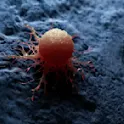
Featured news
18 Jul 2025
Gene essential for vitamin D absorption could help unlock treatments for cancer and autoimmune diseases
Scientists have identified the human gene SDR42E1 as essential for the absorption of vitamin D from the intestine, its subsequent metabolic processing, as well as the production of lipids and steroids. Without the functional protein, the survival of cells dropped by 53%. This discovery has at least two potential applications in precision medicine. First, the experiments showed that the gene can be blocked to selectively kill cancer cells. Second, boosting SDR42E1’s expression could help treat many other diseases, for example, autoimmune and metabolic disorders, against which vitamin D and its related forms are thought to protect.
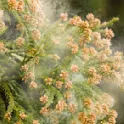
Featured news
11 Jul 2025
‘Molecular shield’ placed in the nose may soon treat common hay fever trigger
Researchers here developed a monoclonal antibody specific against mugwort pollen – an important allergen causing hay fever – in mice, which is highly effective in blocking symptoms of IgE immunoglobin-mediated allergy against this pollen. The monoclonal antibodies can be delivered inside the nose, rather than intravenously, acting almost like a ‘molecular shield’. The study is a proof-of-principle, which can be extended to other pollen species.

Featured news
25 Jun 2025
New ‘designer drugs’ pose growing threat to road safety in the US
Researchers from the US have reported the initial results from the first quantitative study to focus on the contribution of multiple new psychoactive substances (NPS) from a range of classes to roadway crashes in the US. They found that 2% of 1,000 adults who visited one of two trauma centers in California within six hours after being involved in a roadway crash had traces of NPS in their blood. The most frequent were bromazolam, para-fluorofentanyl, and mitragynine. In most (88%) of these positive cases, NPS had been taken together with traditional recreational drugs such as fentanyl, methamphetamine, and cocaine. These results indicate that NPS are a new concern in roadway crashes and put lives at risk.
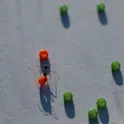
Featured news
13 Jun 2025
Swarm intelligence directs longhorn crazy ants to clear the road ahead for sisters carrying bulky food
Scientists studied the obstacle-clearing behavior of longhorn crazy ants, where a subset of workers temporarily specializes in removing tiny objects blocking the path between the nest and large food items. Experiments revealed that serial clearing behavior can be triggered by a single pheromone mark, which happened to be deposited near an obstacle by a forager recruited to a large food item. Clearing mostly occurs in the context of collective transport, which typically stalls in front of obstacles. The authors concluded that obstacle-clearing is a form of ‘swarm intelligence’ which emerges at the colony level, and which does not require understanding by individual ants.

Health
06 Jun 2025
Statins may reduce risk of death by 39% for patients with life-threatening sepsis
It has been suggested that statins could boost the chances of survival of patients with sepsis because of their multipronged effects on inflammation. Here, researchers from China used the MIMIC-IV database to perform a retrospective cohort study on two large, matched groups: critically ill patients with sepsis in the Beth Israel Deaconess Medical Center who received standard of care with or without statins. The 28-day all-cause mortality was 39% lower in relative terms [an absolute reduction from 23.4% to 14.3%] in the statin group, suggesting a protective effect. Previous randomized controlled trials that didn’t find any such benefit might have been too small or have had other weaknesses. The present results need to be confirmed in a large, well-designed randomized clinical trial.

Featured news
21 May 2025
Biodiversity in Antarctic soils may be greatly underestimated after surprising discovery
Researchers used high-throughput DNA sequencing to measure biodiversity along a transect – a succession from recently exposed to mature soil – in front of a glacier in Antarctica. To capture a detailed ecological ‘time sequence’ they distinguished between intracellular and extracellular DNA from living versus dead or locally extinct species. They found an abundance of previously unsuspected interactions between eukaryotes and prokaryotes, eg, algae with heterotrophic bacteria and fungi with actinobacteria. The results imply that novel mutualistic interactions play an essential role in shaping this system, and that biodiversity in Antarctica may be much greater than previously thought.

Featured news
30 Apr 2025
Deepfakes now come with a realistic heartbeat, making them harder to unmask
Current algorithms for the detection of deepfakes increasingly rely on remote pulse reading to distinguish them from genuine videos of people. Here, scientists show for the first time that the most recent deepfakes feature a global pulse rate which appears realistic. This worrying development makes it necessary for deepfake detectors to become more powerful, for example, by focusing on local variations in blood flow within the face.
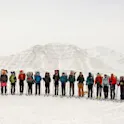
Featured news
29 Apr 2025
Are women more metabolically efficient under extreme physiological circumstances?
Authors from the US have now published a new in study in Frontiers in Physiology. They showed that female athletes are rapidly catching up with, and may soon overtake, their male peers in sports events under extreme physiological circumstances.
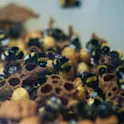
Featured news
10 Apr 2025
How to protect bumblebee colonies safe from killer moths? Keep honeybee hives away from them
Researchers have shown for the first time that bumblebee colonies are more likely to become infested with bumblebee wax moths as they are closer to nearby honeybee hives, which can likewise host these potentially devastating parasites. As the distance to the apiaries decreased, bumblebee colonies were less productive, while their workers showed a weaker general immune response to pathogens and parasites. The authors advise honeybee keepers to keep apiaries away from habitats rich in bumblebees, which are important pollinators but declining worldwide.
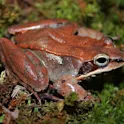
Featured news
26 Mar 2025
Tadpoles try to flee dangerous virus in their pond by growing much faster than normal
Researchers from the US studied the plasticity in growth and development of wood frog larvae in response to the emerging disease ranavirus, which can kill off the entire population of ponds. They showed that tadpoles in infected ponds speed up the rate of growth and progression through the immature stages. They hypothesize that this plasticity boosts their physical condition and hence immune response to ranavirus, and allows them to metamorphose earlier and escape infection.
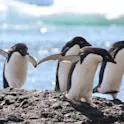
Featured news
20 Mar 2025
Mere whiff of penguin poo pushes krill to take frantic evasive action
Scientists have shown for the first time that Antarctic krill show a stereotypical reaction in the presence of guano from Adélie penguins: they swim faster and make more turns over greater angles. It is unknown to what kind of water-borne chemical cues they respond, but the authors speculate that this behavior might be a universal escape response to the excreta of predators, irrespective of species.

Featured news
27 Feb 2025
Taking sports science in her stride: how Dr Nerea Casal García aims to maximise performance on the track
Casal García is the corresponding author of a new article in Frontiers in Sports and Active Living, which reveals a pronounced recent shift of stride patterns during elite women's 400 meters hurdle competitions. She has kindly taken the time to share some thoughts about her career and research as part of our Frontier Scientist series.